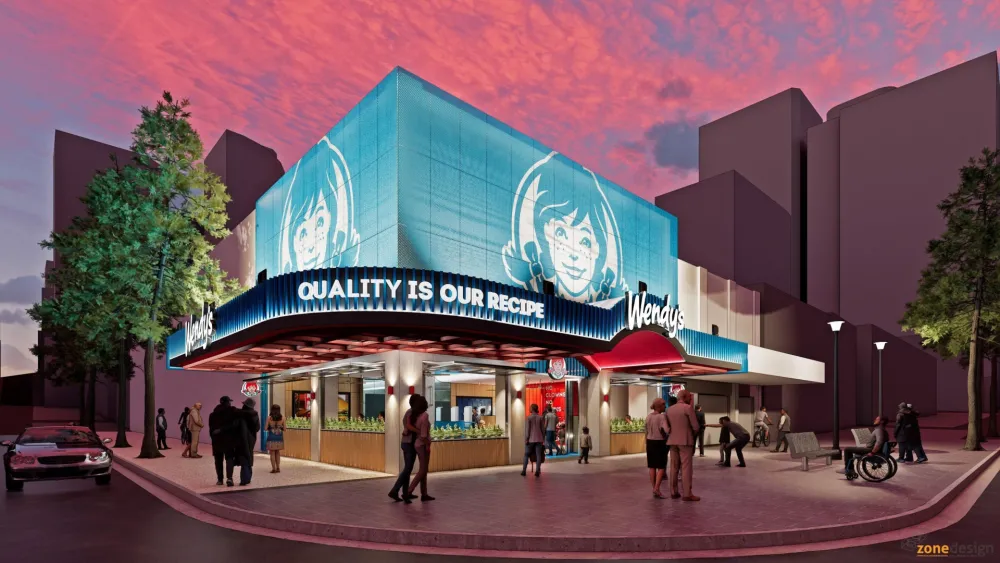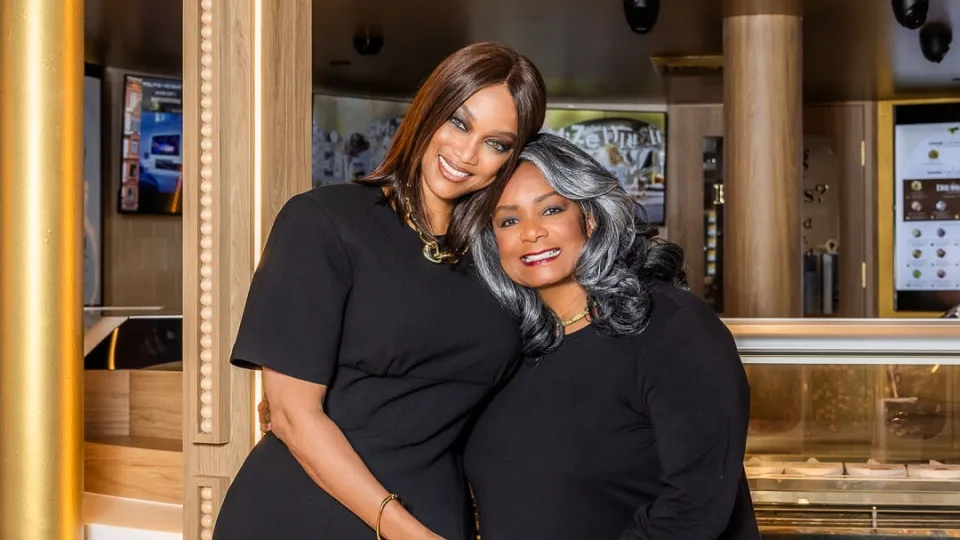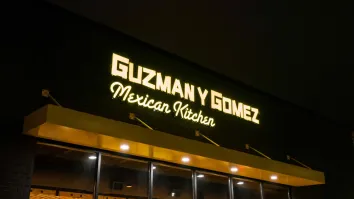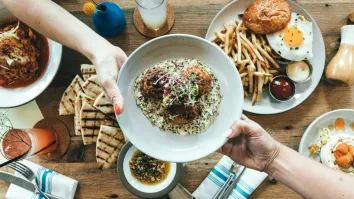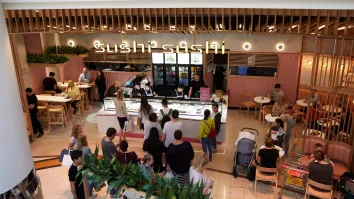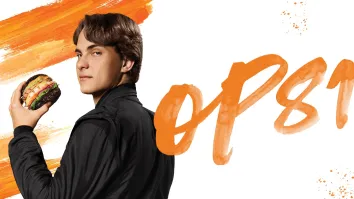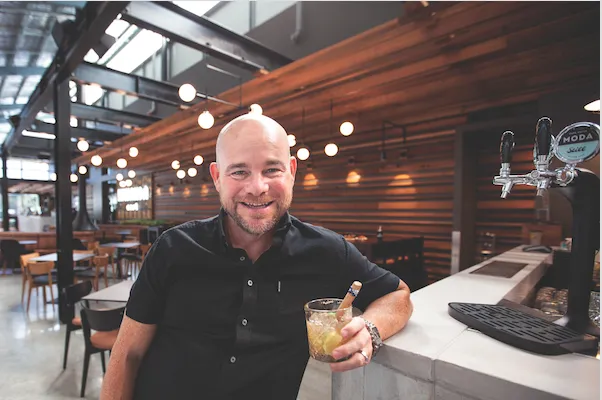
Zarraffa's ramps up their approach to specialty coffee with new Kiwanda concept
Kenton Campbell explains to QSR Media how the factory cafe fits with Zarraffa’s overall growth.
A mecca for specialty coffee enthusiasts - that is how Zarraffa’s Coffee describes its latest factory concept café: Kiwanda.
Swahili for ‘factory’, the approximately 1,200 sqm, 90-seater space includes an espresso bar specifically for beverages and light snacks, and the Kiwanda Kitchen and Bar that presents a range of offerings and beverages, including its signature Espresso Martini.
It is part of the chain’s modern open-plan head office space, combined with its multi-million-dollar coffee ‘engine room’ – the Zarraffa’s Roastery – with an expanded warehousing, packaging and distribution hub.
Kiwanda is also the brainchild of Zarraffa’s founder and managing director Kenton Campbell, who described it to QSR Media as his ‘final part of the dream’. Building the headquarters and factory cafe cost $20 million. (“I stopped counting after that,'' he jokingly explained.)
Complementing its dining and beverage offering will be a Roastery Tour experience set to open later this year, aiming to educate and inform visitors about the Zarraffa’s Coffee bean-to-cup journey through visual and sensory encounters.
Campbell elaborates on the concept in our interview with him below.
QSR Media: In your view, what gap, if any, will Kiwanda fill in an already competitive coffee scene?
Campbell: Kiwanda is not here to fill a gap. It is to make a statement about our brand Zarraffa’s. We have been specialty coffee, we continue to be specialty coffee and not be just another chain. Kiwanda is basically a doorway in a couple of ways: one - [it is] literally the gateway into our office, but is also able to tell a story of how we fit in to the coffee industry here in Australia and New Zealand for the future.
Is Kiwanda’s immersive dining experience a sign of things to come for Zarraffa’s in terms of store model and a response to growing consumer demand for takeaway?
Zarraffa’s will remain Zarraffa’s - we fit the market with our drive-thrus very well. So Kiwanda, in a way, is what is coming. It gives us a chance to do things in coffee that people think we weren’t able to do. A lot of the comments from people in the industry have come in (the cafe) and said that they did not realise that Zarraffa’s was able to do this on such a higher level. We wanted to basically let the industry and our customers know that where we can, we will translate some of the opportunities into the stores.
But really, this is just to pay homage to our customers, to the industry and to the brand itself so that when people do come and experience something, that's very special and, in some ways, unrepeatable.
It will give us the opportunity to see how we can translate some of the ways that we make coffee into the storefronts. The pour over, the Nitro, the cold brew - these are the things that we can test and see if they can work operationally but also whether there's enough demand - true demand for it. So we'll use this [for] R&D (research and development), because it can be a training facility for the brand as well. Kiwanda isn't just our factory cafe; it's also an area (where) we can train people and give them the truth of our brand and the coffee industry as we see it.

Kiwanda Cafe's interior provides a rustic feel. Photo: Supplied
Have discussions been made to schedule the trial of certain products?
Anything that we think is something we can translate into the greater group, we will look to then put it into an R&D-focused working group with the franchisees. And then we will see. Let’s say they were to pick an item here (in the cafe). We try it out, we get some feedback from the customers, we get feedback from our suppliers to see whether or not we get [the product] into the market. Then, we take that and put it into the working group itinerary and look at having that product roll out maybe the next year. It takes six months to a year to go through the whole process.
Do you think there is more opportunity for specialty coffee in the market?
Yeah. I think for our brand - in Australia and New Zealand - we’re only a third of the way there in store numbers - I’m talking about good stores. As far as being able to deliver on those [new products], I think that what this does is give us the unique opportunity to trial and basically create new types of coffee beverages, or to put our style on it. It might be cold brew, but we will do something to make it taste like no other; we're going to try to get the most out of it. It's not going to be new to the market, but I want to make sure that we're [the] best.

Campbell says Kiwanda will provide a 'unique opportunity' to trial and create new coffee offerings. Photo: Supplied
Could you pull back the curtain on deciding to establish Kiwanda? When did you decide to create a space for experimenting on various brewing techniques?
The idea behind it was from the day I purchased the building, and knew Zarraffa’s was coming here. I always knew this is like my final part of the dream ever since I had my first roastery, which was only 60 sqm. This is just that same feeling but on a whole ‘nother level.
I just wanted to do something special because we can do it once. I can do things I can't do in the stores and I think that's what has made it such a unique experience so far.
Could you elaborate on the roastery tours inside the cafe?
We're going to showcase a documentary, which is approximately 15 minutes and highlights the social mind behind the brand. It's going to give an idea of how we feel about the people that produce coffee on the ground.
The sensory room has 360(-degree) VR (virtual reality), which will take people into the mills, it will take them into the plantation. They can see where the coffee regions are, they can see how the coffee is produced.
What most people see is just a coffee being pushed, they hear a grinder or they see some milk. But what they don’t know is that those are just a few hands. There are actually dozens of other people that take their time in their energy to put into this product all the way through. So we want them to - hopefully at the end of this tour - appreciate our brand and the industry on a whole new level. That's what we're hoping to accomplish.

A look inside the roastery. Photo: Supplied
Any thoughts on expanding to other markets who also love coffee, like Indonesia, for example?
I'm never going to say never. But right now, our business plan, which started a few years ago, and is a ten-year business plan to 2027 that talks only of Australia and New Zealand. In saying that, we've always believed that we need a really top notch partner to do that sort of expansion.
So if we were to do it, it has to be a large partner that could come in and have the same ethos as us, have the capital and resources and belief in the brand like we do, and is synergistic with us in all aspects that were necessary for that growth. So I'm not about chasing store numbers. I'm about having a brand that everyone that's a part of it can be proud of. That's my main thing. Being the biggest is not the best for me, being the best is being the best.
The interview has been condensed and edited for clarity.
